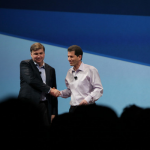Hewlett-Packard: One Messy Piece of Business Cleared Up, Many to Go
“Glad that long national nightmare is over.”
That was the comment — paraphrased from Gerald Ford’s inaugural address upon the close of the Nixon presidency — that I received in an email from an industry source on Friday. The quote was sent in reference to the now-concluded business surrounding Hewlett-Packard’s exploration of “strategic options” concerning its Personal Systems Group.
Now that HP CEO Meg Whitman has concluded that the company is stronger with PCs than without them, there remains a fair bit of unfinished business from the dog’s breakfast of changes announced on Aug. 18.
First and foremost are the questions about the future — or lack thereof — of HP’s webOS business.
The only thing we know for certain is that HP is out of the business of hardware that runs the operating system it picked up in last year’s $1.2 billion acquisition of Palm. HP killed that business after sales of its TouchPad tablet device proved initially disappointing, only to see reduced prices spark a surge in interest from buyers.
During a conference call with analysts earlier this week, Whitman conceded that HP “needs to be in the tablet business” — and that it intends to participate in that business using Microsoft’s tablet-friendly Windows 8 operating system. She also said a long-term decision regarding the webOS software business is forthcoming within the “next couple of months.” HP has already carried out a round of layoffs in that division.
Another not very encouraging sign amid the ongoing uncertainty is the departure of Richard Kerris — who had headed up HP’s webOS developer outreach efforts — for a similar Windows-related job at Nokia.

And related to that is the fate of Jon Rubinstein, the former CEO of Palm and former head of Apple’s iPod business unit. Once the public face of webOS — and of Palm before that, as its final CEO — he has not been visible at all during any of HP’s recent upheavals.
That said, rumors have been almost nonexistent about Rubinstein seeking or being recruited for a job elsewhere. It’s not like he needs the work, but his apparent future is about as cloudy as that of the webOS itself. Currently he’s a product guy without a product; his role at HP is unclear. In July, he was bumped from his title as general manager of the webOS unit and moved into an iffy “product innovation role” within PSG.
One thing is true: Rubinstein has a close relationship with Todd Bradley, who leads the PSG unit.
At least Bradley’s fate is cleared up: The high-profile exec has been the subject of numerous reports and rumors, including a March report in The Wall Street Journal that said he had been recruited by chipmaker Intel. Since then, Bradley has been regularly asked about his future plans.
It was an open secret in Silicon Valley that Bradley feuded with HP’s prior CEO, Léo Apotheker, and was not consulted about the PSG spinoff plan before it was floated to the public.
Still, he stood the best chance of being named the CEO of whatever new company emerged from the plan. Yet Bradley’s voice was heard solidly behind Whitman’s yesterday, both on the conference call and in an interview with AllThingsD.
Bradley made it clear he intends to stay with HP for the forseeable future. His tone, both in public comments and in that joint interview with Whitman, seemed sincere — meaning he has likely arrived at some understanding with Whitman that will keep him at HP.
And Whitman can’t afford to lose a key member of an important business unit just now. (Although, as he has been passed over three times for HP’s top job in recent years, any lingering hopes that Bradley may have harbored of ever being CEO are probably now dashed.)
Outside of the consumer and PC space is the matter of Autonomy, the British software firm for which HP paid $11.7 billion, in a deal also announced on Aug. 18. There’s no question that the purchase price was high, representing a 64 percent premium above Autonomy’s share price, for starters. Many investors have frowned upon the deal, and some have even gone so far as to sue HP over how it was handled, mainly because HP shares cratered after it was announced. What is still to be fully explained is how HP extracts enough value from Autonomy — and if enough value can be extracted to justify the price paid.
Finally, there’s the matter of HP’s results in the coming quarter. With the company in a quiet period ahead of its Nov. 21 earnings announcement, there are few hints as to whether or not HP will meet its already reduced expectations for the quarter. Whitman insisted that no major announcements are expected before then, suggesting that there won’t be any negative pre-announcements.
But much will depend on the tone of the forward guidance HP gives as it looks to 2012. With its shares down nearly 33 percent so far this year — they closed Friday at $27.94, up 85 cents, or more than 3 percent, following Thursday’s decision — it can’t afford to miss another quarter. Once a tech company known for the stability it has given investors, HP has had nothing but unpleasant surprises for the last 14 months.
Now that one piece of the evolving story of the new HP is settled, many more are still in motion.
I talked about this and many of HP’s issues on The Wall Street Journal’s online “Markets Hub” show on Friday, and have embedded it here:








